Related Research Articles

Football Australia is the governing body of soccer, futsal, and beach soccer within Australia, headquartered in Sydney. Although the first governing body of the sport was founded in 1911, Football Australia in its current form was only established in 1961 as the Australian Soccer Federation. It was later reconstituted in 2003 as the Australian Soccer Association before adopting the name of Football Federation Australia in 2005. In contemporary identification, a corporate decision was undertaken to institute that name to deliver a "more united football" in a deliberation from the current CEO, James Johnson. The name was changed to Football Australia in December 2020.
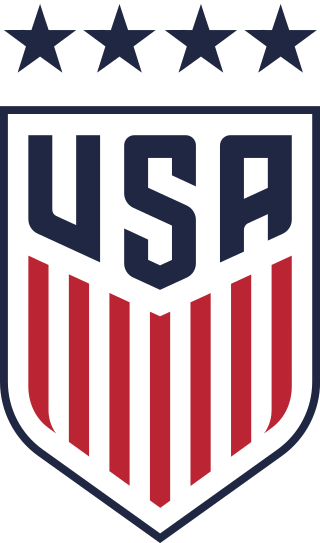
The United States women's national soccer team (USWNT) represents the United States of America in international women's soccer. The team is the most successful in international women's soccer, winning four Women's World Cup titles, four Olympic gold medals, and nine CONCACAF Gold Cups. It has medaled in every World Cup and Olympic tournament in women's soccer except for the 2016 Olympic tournament, in which it was eliminated in the quarterfinals by Sweden. The team is governed by United States Soccer Federation and competes in CONCACAF.
A-League Men is the highest-level professional men's soccer league in Australia and New Zealand. At the top of the Australian league system, it is the country's premier men's competition for the sport. A-League Men was established in 2004 as the A-League by the Football Federation Australia (FFA) as a successor to the National Soccer League (NSL) and competition commenced in August 2005. The league is currently administered by the Australian Professional Leagues (APL), contested by twelve teams; eleven based in Australia and one based in New Zealand. The men's, women's and youth leagues have now been brought together under a unified A-Leagues banner.

Soccer in the Australian Capital Territory (ACT) is predominantly amateur with a local, interstate, national and international history. Football in the ACT is organised and administered by Capital Football and involves teams from within the ACT and surrounding NSW regions, Monaro, Southern Tablelands and Riverina.

Alen Stajcic is an Australian football manager and former player. He is the current head coach of the Philippines women's national football team. While as a footballer he was a NSW Premier League player and an Australian Youth Representative.

Lisa Marie De Vanna is an Australian professional soccer player who plays as a forward for Perth Glory. She has previously played for Adelaide Sensation, Western Waves, Doncaster Rovers Belles, AIK, Perth Glory, Washington Freedom, Brisbane Roar, magicJack, Newcastle Jets, Linköping, Sky Blue FC, Melbourne Victory, Boston Breakers, Washington Spirit, Melbourne City, North Shore Mariners, Orlando Pride, Canberra United, South Melbourne, Sydney FC, and Fiorentina as well as representing the Australian national team 150 times. She is noted for her pace and dribbling skills. She has been regularly considered one of the greatest female footballers in the world; football analyst and former Socceroo Craig Foster stated that she "ran on jet-fuel; burning up twice as fast, but with incredible impact."
A-League Women, formerly the W-League, is the top-division women's soccer league in Australia. The W-League was established in 2008 by Football Australia and was originally composed of eight teams of which seven had an affiliation with an existing A-League Men club. As of the 2022–23 season, the league is contested by eleven teams. The league, as well as the A-League Men and A-League Youth are administered by the Australian Professional Leagues.
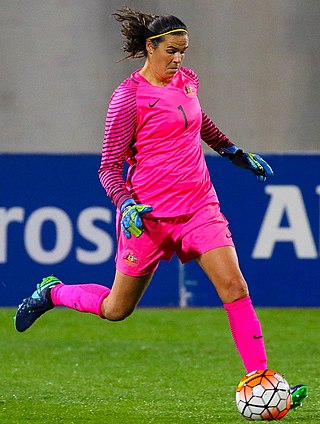
Lydia Grace Yilkari Williams is an Australian professional soccer player who plays as a goalkeeper for Women's Super League club Brighton & Hove Albion and the Australia national team.

Samantha May Kerr is an Australian professional soccer player who plays as a forward for Chelsea in the FA Women's Super League and the Australia women's national team, which she has captained since 2019. She is widely considered as one of the best forwards of all time in women's soccer. As of 2022, Kerr is the all-time leading Australian international scorer, and is the all-time leading scorer in the National Women's Soccer League (NWSL) in the United States. She is the only female soccer player to have won the Golden Boot in three different leagues and on three different continents – the W-League in 2017–18 and 2018–19, the NWSL in 2017, 2018, and 2019, and the FAWSL (Europe) in 2020–21 and 2021–22.
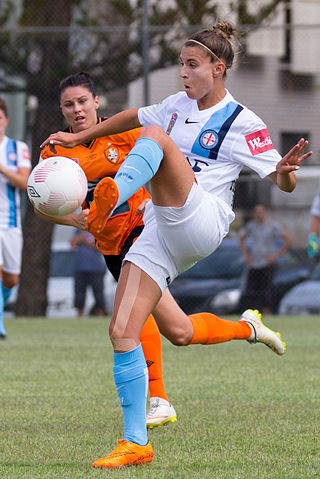
Stephanie-Elise Catley is an Australian professional soccer player who plays as a defender for Arsenal and the Australia national team. She can play in many positions in defence, such as left-back, centre-back or sweeper.

The Australia women's national soccer team is overseen by the governing body for soccer in Australia, Football Australia, which is currently a member of the Asian Football Confederation (AFC) and the regional ASEAN Football Federation (AFF) since leaving the Oceania Football Confederation (OFC) in 2006. The team's official nickname is "the Matildas", having been known as the "Female Socceroos" before 1995.
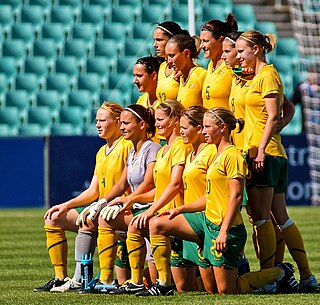
Women's soccer, also known as women's football, is a popular sport in Australia. The sport has a high level of participation in the country both recreational and professional. Football Australia is the national governing body of the sport in Australia, organising the A-League Women, the Australian women's national team, and the nine state governing bodies of the game, among other duties. Women's participation of modern soccer has been recorded since the early 1920s. It has since become one of Australia's most popular women's team sports.
Melbourne City Women's Football Club, also known as the Melbourne City Women or simply as City, represents Melbourne City in the A-League Women, the top division soccer league in Australia. Founded in 2015, the club has its training and administration based at the City Football Academy in Melbourne and plays matches at Casey Fields in Casey and at AAMI Park in Melbourne. The current manager of the team is Dario Vidošić.
The U.S. Women's National Team Players Association (USWNTPA) is a labor union representing the United States women's national soccer team (USWNT). The organization's primary mission is to protect the rights of the USWNT and to safeguard the economic and social welfare of all of the women's national team players.
Sonia Gegenhuber is a retired Australian soccer player who played 75 times for Australia and was a national captain.

Starting in 2016, members of the United States women's national soccer team (USWNT) have engaged in a series of legal actions against the United States Soccer Federation, accusing the organization of unequal treatment and compensation. The fight for equal pay has received widespread media attention, inspired legislative action in the U.S. Senate, and received popular support, including fan chants of "Equal pay" at the 2019 FIFA Women's World Cup matches in France. A landmark equal pay agreement was reached in February 2022.
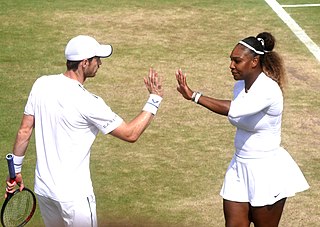
Gender pay gap in sports is the persistence of unequal pay in sports, particularly for female athletes who do not receive equal revenue compared to their counterparts, which differs depending on the sport. The gender pay gap has not evolved since 1983, even though the two genders both equally influence world records and best performances in our nations sports teams.According to the research conducted by BBC, "a total of 83% of sports now reward men and women equally". However, it does not mean that the wage gap in sports has narrowed or disappeared. In 2018, Forbes released the list of the top 100 highest-paid athletes, all of them being male athletes. A similar situation also occurred in 2017, where there was only one female athlete – tennis player Serena Williams — who joined the list and ranked No.56. Billie Jean King brought awareness to the issue of unequal pay in the early 1970s, when she was awarded $2,900 less than her male counterpart at the Italian Open. The timeline of the gender pay gap in sports displays the significant events that have occurred since the 1970s.
James Johnson is an Australian sports administrator and business person who has served as CEO of Football Australia since January 2020. He is also a non-executive advisory board member of the Association Football Development Program Global chaired by Prince Ali bin Hussein of Jordan. Johnson has spent the bulk of his career in the global sports industry and is a highly regarded global sports executive. Johnson has been a featured speaker at sports forums and conferences in areas, including, the international transfer system, financial fair play, multi-club ownership, salary caps, as well as the globalisation, commercialisation, and business of sports. Johnson spent the early period of his career as a lawyer practicing in the areas corporate law, litigation, and industrial relations.
The 2017 Denmark women's national football team strike was a two-month long strike by the players of the Denmark women's national football team. Supported by the players' union Spillerforeningen, the two-month long strike saw the eventual signing of a new collective bargaining agreement (CBA) between the players and the Danish Football Association.
Professional women's association football players have organized to dispute several issues specific to the sport, such as disparities in compensation compared to men's teams; insufficient pay to compete with other women's teams; unfair or exclusionary financial terms of federation business agreements involving the team; a lack of minimum standards in facilities and treatment, especially compared to men's teams in the same federation, league, or club; reports of systemic gender-related abuse of players, including sexual abuse being ignored by league or federation officials; and a lack of benefits specific to women such as paid leave for pregnancy and maternity, and child care coverage.
References
- ↑ Convery, Stephanie (11 September 2015). "The Matildas' pay dispute could spark real change". ABC News. Retrieved 23 September 2021.
- ↑ "'They ARE feminine': The Matildas' long road from sexism in '79 to sellouts in '17". TheGuardian.com . 15 September 2017.
- ↑ Connelly, Paul (15 September 2017). "'They ARE feminine': the Matildas' long road from sexism in '79 to sellouts in '17". the Guardian. Retrieved 23 September 2021.
- ↑ Williams, Jean (2007). "Waltzing the Matildas: Women's Football in Australia". A Beautiful Game: International Perspectives on Women's Football. Berg Publishers. p. 165. ISBN 978-1845206758.
- ↑ "Women's World Cup 2015: Remove the gender lens and back the Matildas". The Sydney Morning Herald. 20 June 2015. Retrieved 2 June 2016.
- ↑ Aimee Lewis (2 June 2019). "From nude calendars to title contenders: The Matildas' long road to success". CNN.
- ↑ "Waltzing a fine line". The Sydney Morning Herald. 24 January 2003. Retrieved 2 June 2016.
- ↑ "Job security concerns Matildas as pay saga drags on". Topics.
- ↑ "How much are Australia's male and female sports teams paid?". the Guardian. 15 September 2015.
- ↑ Ison, Rebekah; McKay, Ben (24 June 2015). "Matildas vs Socceroos: the gender pay gap". The New Daily. Retrieved 23 September 2021.
- ↑ "Matildas to face world champion USA". Topics.
- ↑ "Matildas go on strike to put USA games in jeopardy". Topics.
- ↑ "Matildas player strike: what are the key pay demands and disputes ahead?". the Guardian. 11 September 2015.
- ↑ "FFA fires broadside at PFA over Matildas boycott". SBS. Source: Football Federation Australia. 8 September 2015. Retrieved 23 September 2021.
- ↑ Windley, Matt (9 September 2015). "'I just want to play for my country'".
- ↑ "Inside the Matildas' strike". ABC Radio National. 11 December 2013.
- ↑ "Australian Women's Soccer Team Fights For Respect, Goes On Strike".
- ↑ Staff, S. I. "Haiti, not Australia, to play USWNT". Sports Illustrated.
- ↑ "U.S. women's soccer 'disappointed' Australia can't play, Wambach supports the strike". mlive. 17 September 2015.
- ↑ Dingle, Sarah (16 October 2015). "Matildas Strike: team members told to go on the dole, says retired player". ABC Radio. Retrieved 23 September 2021.
- ↑ "FFA agree new CBA with Matildas receiving pay increase". The Women's Game.
- ↑ Cherny, Daniel (9 November 2015). "Matildas strike vindicated by pay increase, says midfielder Hayley Raso". The Sydney Morning Herald.
- ↑ "The National Sports League Where Women Can Earn Less Than A McDonald's Worker". HuffPost. 20 October 2015.
- ↑ "The gender pay gap for the FIFA World Cup is US$370 million. It's time for equity".
- ↑ Crawford, Fiona (6 November 2019). "Showing them the money: why the Matildas' pay deal is a triumph for all". The Sydney Morning Herald.
- ↑ Australia, Carly Williams HuffPost (6 November 2019). "Australian Women's Soccer Team Will Finally Get Paid The Same As Men's Team". HuffPost.
- ↑ Pelissier, Jean-Paul (6 November 2019). "The details that make the Matildas' new pay deal truly 'momentous'". ABC News. Reuters – via www.abc.net.au.
- ↑ Helen Regan (6 November 2019). "Australia's women footballers get equal pay in landmark deal". CNN.
- ↑ View, The Herald's (6 November 2019). "Soccer shows equal pay for women is no pipedream". The Sydney Morning Herald.